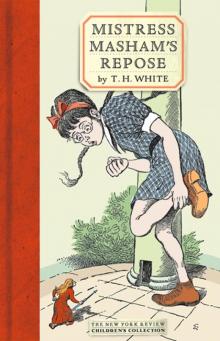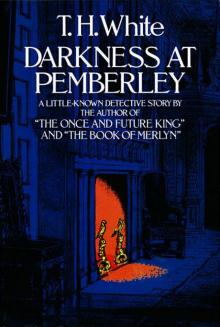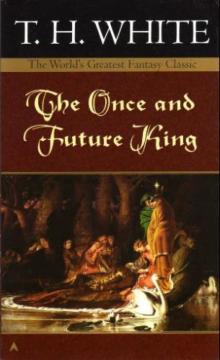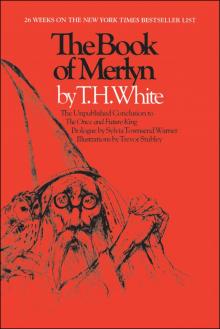- Home
- T. H. White
The Once and Future King Page 3
The Once and Future King Read online
Page 3
It was the age of fullness, the age of wading into everything up to the neck. Perhaps Arthur imposed this ideal on Christendom, because of the richness of his own schooling under Merlyn.
For the King, or at least this is how Malory interprets him, was the patron saint of chivalry. He was not a distressed Briton hopping about in a suit or woad in the fifth century—nor yet one of those nouveaux riches de la Poles, who must have afflicted the last years of Malory himself. Arthur was the heart's king of a chivalry which had reached its flower perhaps two hundred years before our antiquarian author began to work. He was the badge of everything that was good in the Middle Ages, and he had made these things himself.
As Malory pictures him, Arthur of England was the champion of a civilization which is misrepresented in the history books. The serf of chivalry was not a slave for whom there was no hope. On the contrary, he had at least three legitimate ways of rising, the greatest of which was the Catholic Church. With the assistance of Arthur's policies this church—still the greatest of all corporations free to learned men on earth—had become a highway open to the lowest slave. A Saxon peasant was Pope in Adrian IV, the son of a carpenter in Gregory VII. In those despised Middle Ages of theirs you could become the greatest man in the world, by simply having learning. And it is a mistake to believe that Arthur's civilization was weak in this famous science of ours. The scientists, although they happened to call them magicians at the time, invented almost as terrible things as we have invented—except that we have become accustomed to theirs by use. The greatest magicians, like Albertus Magnus, Friar Bacon, and Raymond Lully, knew several secrets which we have lost today, and discovered as a side issue what still appears to be the chief commodity of civilization, namely gunpowder. They were honoured for their learning, and Albert the Great was made a bishop. One of them who was called Baptista Porta seems to have invented the cinema—though he sensibly decided not to develop it.
As for aircraft, in the tenth century a monk called Aethelmaer was experimenting with them, and might have succeeded but for an accident in adjusting of his tail unit. He crashed "quod"—says William of Malmesbury—"caudam in posteriori parte oblitus fuerat adaptare."
Even in modernity, the ages of darkness were not so far behind us. At least they had some sparkling names for their fiercer cocktails: which they called Huffe Cap, Mad Dog, Father Whoresonne, Angel's Food, Dragon's Milke, Go to the Wall, Stride Wide, and Lift Leg.
The view from the window was delightful, though in some cases it was odd. Where we have hedged fields and parklands, they had village communities, moorlands, fens and forests of enormous size. Sherwood stretched for hundreds of miles, from Nottingham to the middle of York. The busyness that went on in the island, the bee–keeping and the rook–scaring and the ploughing with oxen: for these you must look in the Lutterell Psalter, where they are beautifully drawn. In those days, if you had been interested by peculiar things, perhaps you would have had the luck to notice a knight–in–armour riding past the window. You would have noticed his head, which was shaved round the ears and at the back: but on the top his hair rose up like a Japanese doll's, so that the skull looked like a cottage loaf. This top–knot made an excellent shock–absorber, under his helm. The next man to pass might have been a clerk, perhaps on an ambler, and the hair of this one would have been exactly the opposite of the knight's—for he would have been completely bald on top, because of his tonsure. When he had gone to the bishop to be made a clerk in the first place, he had taken a pair of scissors with him. Next, if you wanted some peculiar person to ride by, there might have come a crusader who had promised to deliver the grave of God. You would have expected the cross on his surcoat, no doubt, but you might not have realized that he was so delighted with the whole affair that he put the same symbol almost everywhere that it could be made to go. Like a new Boy Scout, transported with enthusiasm, he would have stuck the cross on his escutcheon, on his coat, on his helm, on his saddle, and on the horse's curb. The next man to pass the window might have been one sort of Cistercian lay–brother, whom you would have expected to be a learned man because of his cloth. But no, he was ex officio an illiterate. It was his business to stick the leaden seals on papal bulls, and, so as to preserve the Secrecy of the Pope, they used to make sure that he could not read a word. Now might come a Saxon wearing the beard and a sort of Phrygian cap, as a sign of defiance—now a knight from the Marches of the Northern border. The latter, because he lived by raiding during the night–time, would have borne a moon and stars on azure in his coat. Here might be some smoke in the landscape, rising from the bellows of an alchemist who was, most sensibly, trying to turn lead to gold—an art which has remained beyond us to the present day, though we are getting nearer to it with atomic fusion. There, far away in the environs of a monastery, you might have seen a procession of angry monks making a barefoot march round their foundation—but they might have been walking against the sun, in malediction, because they had fallen out with the abbot. Perhaps, if you looked in this direction, you would see a vineyard fenced with bones—it had been discovered, during the early years of Arthur, that bones made an excellent fence for vineyards, graveyards, or even for forts—and perhaps, if you looked in the other, you would see a castle door that looked like a keeper's gallows. It would have been completely covered with the nailed heads of wolves, bears, stags, and so forth. Far away, over there to the left, perhaps there would be a tournament going on according to the laws laid down by Geoffrey de Preully, and the Kings–at–arms would be carefully examining the combatants, like referees before a boxing match, to see that they were not stuck to their saddles. The referees at a judicial duel between a certain Earl of Salisbury and a Bishop of Salisbury, under the supposed King Edward III, found that the bishop's champion had prayers and incantations sewn all over him, under his armour—which was almost as bad as a boxer hiding a horse–shoe in his glove. Below the window–ledge a pair of constipated papal nuncios might have been riding gloomily back to Rome. Such a pair were once sent with bulls to excommunicate Barnabas Visconti, but Barnabas only made them eat their bulls—parchment, ribbons, leaden seals and all. Following closely behind them perhaps there would have strode a professional pilgrim, supporting himself on a stout knobbed staff shod like an alpenstock and weighed down with blessed medals, relics, shells, vernicles and so forth. He would have called himself a palmer and, if he were a well–travelled one, his relics might have included a feather from the Angel Gabriel, some of the coals on which St. Lawrence was grilled, a finger of the Holy Ghost "whole and sound as ever it was," "a vial of the sweat of St. Michael whereas he fought with the devil," a little of "the bush in which the Lord spake to Moses," a vest of St. Peter's, or some of the Blessed Virgin's milk preserved at Walsingham. After the palmer perhaps there would have prowled a rather more sinister figure: one of those who "sleep by day and watch by night, eat well and drink well, but possess nothing." He would be an outlaw, of whom they wrote:
"For an outlawe this is the lawe, that men hym take and binde
Wythout pytee, hanged to bee, and waver with the wynde."
But before he came to his last wavering in the wind, he would have lived a free life. His mate would be marching sturdily beside him, also with a price on her head—her hair shaven off before she took to the woods, and known as a weyve. She would glance back occasionally, alert for the hue and cry with which they might be hunted.
Here might come a baron with a hot pie carried carefully before him, because he had to bring such a pie to the King once a year, so as to let King Arthur sniff it in payment of his feudal dues. There might go another baron at full tilt after some dragon or other, and bump! down he might come, while the horse cantered away. But if he did so, one of his attendants would immediately mount him again on his own horse―just as we would do to a master–of–hounds today—because that was the feudal law. In the distance of the north, under the fading sunset, there might spring up the cottage light of some busy witch who was not only
making a wax image of somebody she disapproved of, but also getting the image baptised—this was the operative factor—before she stuck some pins into it. One of her priestly friends, by the way, who had gone to the Little Master, might be willing to say a Requiem Mass against anybody you wanted to dispose of—and, when he came to the "Requiem aeternum dona ei, Domine," he would mean it, although the man was alive. Equally distant in the west, under the same sunset, you might have seen Enguerrand de Marigny, who built the enormous gallows at Mountfalcon, himself rotting and clanking on the same gallows, because he had been found guilty of Black Magic. The Dukes of Berry and Brittany, two decent men, might have been trotting along the road, in satin cuirasses which imitated steel. These two did not like to accept the advantage of armour, and, finding the satin cooler to wear, they were determined to be ordinary and brave. Lancelot might have done the same sort of thing. Above them on the hillside, but unobserved by them, might have sat Joly Joly Wat, with his tar–box beside him. He was the most typical figure of Gramarye, his tar being the antiseptic of his sheep. If you had said to him, "Don't spoil the ship for a ha'porth of tar," he would have agreed with you at once—for it was he who invented the adage, which we have translated from sheep into ships.
Towards the remoter distance perhaps a bankrupt might have been getting a vigorous whacking in some muscovite market–place—not out of ill–feeling toward himself, but in the fervent hope that if only he squealed loud enough some of his friends or relations in the crowd would pay his debts out of commiseration. Further south, towards the Mediterranean basin, you might have seen a seaman being punished for gambling, under a law of Richard Coeur de Lion. The punishment consisted in being thrown into the water three times from the mainmast tree, and his comrades used to acclaim each belly–flopper with a cheer. A third ingenious punishment might possibly have been inflicted in the market–place below you. A wine merchant whose wares were of bad quality would have been stuck in the pillory and there he would have been made to drink an excessive quantity of his own liquor—after which the rest would be poured over his head. What a headache next morning! In this direction, if you happened to be broad–minded, you might have been amused to see the saucy Alisoun who cried "Tee–Hee!" after she had been given the unusual kiss which Chaucer tells about. In that one, you might notice an exasperated Miller and his family, trying to straighten out the hurrah's nest which happened last night through the displacement of a cradle, as the Reeve tells in his tale. A schoolboy who had had the good luck and the initiative to shoot an Earl of Salisbury dead, with one of the new–fangled cannons, might be being idolized by his fellow scholars in the playground of yonder monastery school. Plum trees, only lately introduced like Merlin's mulberry, might be shedding blossom under the light of eve beside the playground. Another little boy, this time a king of four years old in Scotland, might be sadly issuing a royal mandate to his Nannie, which empowered her to spank him without being guilty of High Treason. A disreputable army, who used to live by the sword as a trained band, might be begging its bread from door to door—a good fate for all armies—and a man who had taken sanctuary in that church away to the east there, might have had his leg cut off because he had taken half a step outside the door. In the same sanctuary there would be quite a congeries of forgers, thieves, murderers and debtors, all busy forging away or sharpening their knives for the evening's outing, in the restful seclusion of the church where they could not be arrested. The worst that could happen to them, once they had got their sanctuary, was banishment. Then they would have had to walk to Dover, always keeping to the middle of the road and clutching a crucifix—if they let go of it for a moment, you were allowed to attack them—and, once there, if they could not get a boat immediately, they would have had to walk into the sea daily up to their necks, to prove that they were really trying.
Did you know that in these dark ages which were visible from Guenever's window, there was so much decency in the world that the Catholic Church could impose a peace to all their fighting—which it called The Truce of God—and which lasted from Wednesday to Monday, as well as during the whole of Advent and Lent? Do you think that they, with their Battles, Famine, Black Death and Serfdom, were less enlightened than we are, with our Wars, Blockade, Influenza and Conscription? Even if they were foolish enough to believe that the earth was the centre of the universe, do we not ourselves believe that man is the fine flower of creation? If it takes a million years for a fish to become a reptile, has Man, in our few hundred, altered out of recognition?
Chapter IV
Lancelot and Guenever Looked Over the Sundown of Chivalry, From the Tower Window. Their Black Profiles Stood Out in Silhouette Against the Setting Light. Lancelot's, the Old Ugly Man's, Was the Outline of a Gargoyle. It Might Have Looked in Hideous Meditation From Notre Dame, His Contemporary Church. but, in Its Maturity, It Was Nobler Than Before. the Lines of Ugliness Had Sunk to Rest as Lines of Strength. Like the Bull-dog, Which is One of the Most Betrayed of Dogs, Lancelot Had Grown a Face Which People Could Trust - The Touching Thing Was That the Two Were Singing. Their Voices, No Longer Full in Tone Like Those of People in the Strength of Youth, Were Still Tenacious of the Note. if They Were Thin, They Were Pure. They Supported One Another
"When that the moneth of May (sang Lancelot)
Comes and the day
In beames gives light,
I fear no more the fight."
"When," sang Guenever,
"When that the sonne,
His daily course y–ronne,
Is no more bright,
I fear namore the night."
"But oh," they sang together,
"But oh, both day and night,
My heart's delight,
Must one day leave foredone
All might, all gone."
They stopped, with an unexpected grace–note on the portative, and Lancelot said: "Your voice is good. I'm afraid mine is getting rusty."
"You shouldn't drink spirits."
"What an unfair thing to say! I have been nearly a teetotaller since the Grail."
"Well, I had rather you didn't drink at all."
"Then I won't drink, not even water. I will die of thirst at your feet, and Arthur will give me a splendid funeral, and never forgive you for making me."
"Yes, and I shall go into a Nunnery for my sins, and live happily ever after. What shall we sing now?"
Lancelot said: "Nothing. I don't want to sing. Come and sit close to me, Jenny."
"Are you unhappy about something?"
"No. I was never so happy in my life. And I dare say I shall never be so happy again."
"Why so happy?"
"I don't know. It is because the spring has come after all, and there is the bright summer in front of us. Your arms will go brown again, just a flush along the top here, and a rosy round elbow. I am not sure I don't like the places where you bend best, like the insides of your elbows."
Guenever retreated from these charming compliments.
"I wonder what Arthur is doing?"
"Arthur is visiting the Gawaines, and I am talking about your elbows."
"I see."
"Jenny, I was happy because you were ordering me about. That's the explanation. You were nagging about not drinking too much. I like you to look after me, and to tell me what I ought to do."
"You seem to need it."
"I do need it," he said. And then, with a suddenness which surprised them both: "May I come tonight?"
"No."
"Why not?"
"Lance, please don't ask. You know that Arthur is at home, and it is much too dangerous."
"Arthur won't mind."
"If Arthur were to catch us," she said wisely, "he would have to kill us."
He denied it.
"Arthur knows all about us. Merlyn warned him in so many words, and Morgan le Fay sent him two broad hints, and then there was the trouble with Sir Meliagrance. But he doesn't want to have things upset. He would never catch us unless he was made to.
"
"Lancelot," she said angrily, "I am not going to have you talking about Arthur as if he were a go–between."
"I am not talking about him like that. He was my first friend, and I love him."
"Then you are talking about me as if I were worse."
"And now you are behaving as if you were."
"Very well, if that is all you have to say, you had better go."
"So that you can make love to him, I suppose."
"Lancelot!"
"Oh, Jenny!" He jumped up, nimble as ever, and caught her. "Don't be angry. I am sorry if I was unkind."
"Go away! Leave me alone."
But he continued to hold her tightly, like someone restraining a wild animal from running away.
"Don't be angry. I am sorry. You know I didn't mean it."
"You are a beast."
"No, I am not a beast, and nor are you. Jenny, I shall go on holding you until you stop being cross. I said it because I was miserable."

 The Once and Future King (#1-4)
The Once and Future King (#1-4) Once & Future King 05 - The Book of Merlyn
Once & Future King 05 - The Book of Merlyn Mistress Masham's Repose
Mistress Masham's Repose Darkness at Pemberley
Darkness at Pemberley The Once and Future King
The Once and Future King The Book of Merlyn
The Book of Merlyn Candle in the Wind
Candle in the Wind